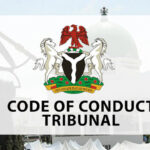Controversy has greeted the latest move that removed Danladi Umar as the chairman of the Code of Conduct Tribunal (CCT).
The recent resolutions by both the Senate and House of Representatives removing Umar followed a series of events this year and previous controversies that marred his tenure.
Umar’s long tenure at the CCT saw him engage in heated exchanges with defence lawyers in the open court, sudden bench rulings, petitions of official misconduct and a street altercation with a security guard in Abuja.
During a proceeding on the matter recently, the Senate recommended his removal after 84 members voted to support a motion by Majority Leader Opeyemi Bamidele.
- Bawumia, Mahama battle as Ghanaians choose new president today
- 2027: Zoning takes front seat as early campaigns begin for Nasarawa guber race
Bamidele’s motion relied on section 157(2) of the Nigerian constitution, which states, “Subject to the provisions of subsection 3 of this section, a person holding any of the offices to which this section applies may only be removed from that office by the president acting on an address supported by two-third majority of the Senate praying that he be so removed for an inability to discharge the functions of the office (whether arising from infirmity of mind or body or any other cause) or for misconduct.”
The House of Representatives, in a resolution on November 26, also invoked section 17 (3), part 1, Fifth Schedule of the Nigerian constitution (as amended) to remove Umar from office.
The resolution of the House followed the adoption of a motion by the Majority Leader, Prof Julius Ihonvbere. The assembly declared that it was merely concurring with the earlier resolution of the Senate removing Umar.
He drew the attention of his colleagues to the fact that Umar engaged in a public fight with a security guard at the Banex Plaza Shopping Complex, Abuja in 2021, necessitating an invitation from the Senate Committee on Ethics, Code of Conduct and Public Petitions.
However, the Senate later, on November 27, corrected its earlier resolution, which relied on section 157(3) of the Nigerian constitution, to now rely on section 17(3), part 1 of the Fifth Schedule to the same constitution and section 22 (3) of the Code of Conduct Bureau and Tribunal Act Cap C15, LFN 2004.
The section provides that, “A person holding the office of chairman or member of the Code of Conduct Tribunal shall not be removed from his office or appointment by the president except upon an address supported by 2/3rd majority of each house of the National Assembly praying that he be so removed for an inability to discharge the functions of the office in question (whether arising from infirmity of mind or body) or for misconduct or for contravention of this code.”
Besides the street altercation mentioned by the lawmakers as being a breach of the ethical conduct of the embattled CCT boss, his tenure had witnessed several other controversies.
In the street altercation on March 29, 2021, Umar was seen in a viral video assaulting a security guard, Clement Sagwak at Banex Plaza, Wuse 2, Abuja over a parking position in the plaza, which forced the Senate to open a probe on the matter.
Some of the controversies stem from how high-profile defendants criticised his proceedings. For instance, in 2016, the then Senate President Bukola Saraki asked him to recuse himself from his trial for an alleged 16-count charge bordering on false assets declaration and violation of the provisions of the code of conduct for public officers, which he was eventually discharged and acquitted.
Saraki claimed that the threat by Umar in the open court, that he would ensure the defence lawyers didn’t employ delay tactics in his case, was a clear indication that the tribunal had made up its mind to convict him at all costs, irrespective of the evidence at the trial.
Umar, in his ruling in April 2016, refused to recuse himself, and instead, dismissed Saraki’s defence lawyer, Raphael Olueyede from the court after he accused the chairman of bribery and bias.
Similarly, the trial of the former Chief Justice of Nigeria, Walter Onnoghen over an alleged false asset declaration, stirred more controversy after Umar insisted on proceeding with the matter and summoning his appearance despite an application to hands off the trial.
In February 2019, Onnoghen claimed that there was a likelihood of bias from Umar, whom he described as a “tainted arbiter” who had constituted himself as a “prosecutor, judge and jury who has constructively convicted” him without either hearing from the defendant or his being formally arraigned before him.
Onnoghen had insisted that under the constitution’s provisions, a judicial officer could only be tried after he had been so tried and derobed by the National Judicial Council (NJC).
Following Umar’s hardline posture, a Lagos-based lawyer, Olisa Agbakoba, a Senior Advocate of Nigeria (SAN), in April 2019, filed a petition against him before the Legal Practitioners’ Disciplinary Committee (LPDC) while calling on the Nigerian Bar Association (NBA) and Body of Benchers to activate the profession’s disciplinary process against him.
Agbakoba contended that the NBA had the jurisdiction to try Umar as a lawyer despite his argument that he was not under the association’s disciplinary control.
The tribunal proceeded to convict Onnoghen, but the Court of Appeal in Abuja recently voided the conviction.
The latest debate on the removal of Umar appeared earlier in August when President Bola Tinubu announced his removal and replacement with Dr Mainasara Umar Kago, who had reportedly resumed office.
However, lawyers criticised the manner of the president’s removal of Umar.
Reacting then, the Dean of the Faculty of Law at the Bayero University, Kano, Prof Mamman Lawan-Yusufari, said the removal of Umar at 53 as against the provided 70 years and without the recommendation of the National Judicial Council on the advice of the Federal Judicial Service Commission as provided in the constitution, was illegal.
Similarly, Ikoro N. Ikoro said, “There is a mandatory requirement of termination of appointment at the age of 70. He is still 53 or so years old, so age could not have been a factor. There is no doubt that there was a call for the man to be sacked after a slap incident in Abuja or how he treated Onnoghen, but after that event, he was not sacked.
“The government is required to go through the right channels to make sure that the trust embedded in that office is maintained if he must be removed.”
Reacting, Hameed Ajibola Jimoh said section 157 of the Constitution of the Federal Republic of Nigeria, 1999 (as amended) was clear that the following shall be required as conditions and procedures for the removal of the CCT chairman thus: “Two-third majority of the Senate (only) must send a formal address to the president or an address in plenary session that he (the CCT chairman) be removed from office for whatever reason given for such request; then the president, if convinced about the allegation or allegations against the CCT chairman, may remove him or may not (if he does not believe or there is no substantial evidence to substantiate the allegation).”
He added that the removal of the CCT chairman was both legislative and executive as a joint role.
Similarly, E.M.D. Umukoro said the constitution was clear on the mode the CCT chairman or member of the tribunal can be removed.
He explained that they could only be removed when the National Assembly, through a resolution supported by two-third majority decision, addresses the president, to the effect that the chairman or member of the CCT is unable to perform the functions of his or her office, either by deformity of the mind or body, or gross misconduct. He added that the only regular means of replacement of the chairman or members of the CCT was either through death, retirement or the inability to function.

 Join Daily Trust WhatsApp Community For Quick Access To News and Happenings Around You.
Join Daily Trust WhatsApp Community For Quick Access To News and Happenings Around You.


